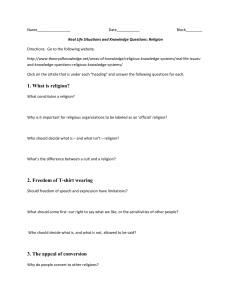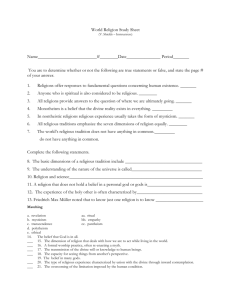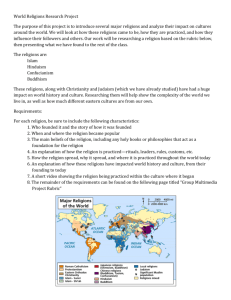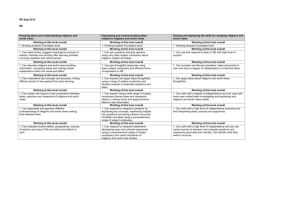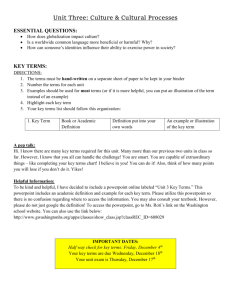Varieties of Religious Experience
advertisement
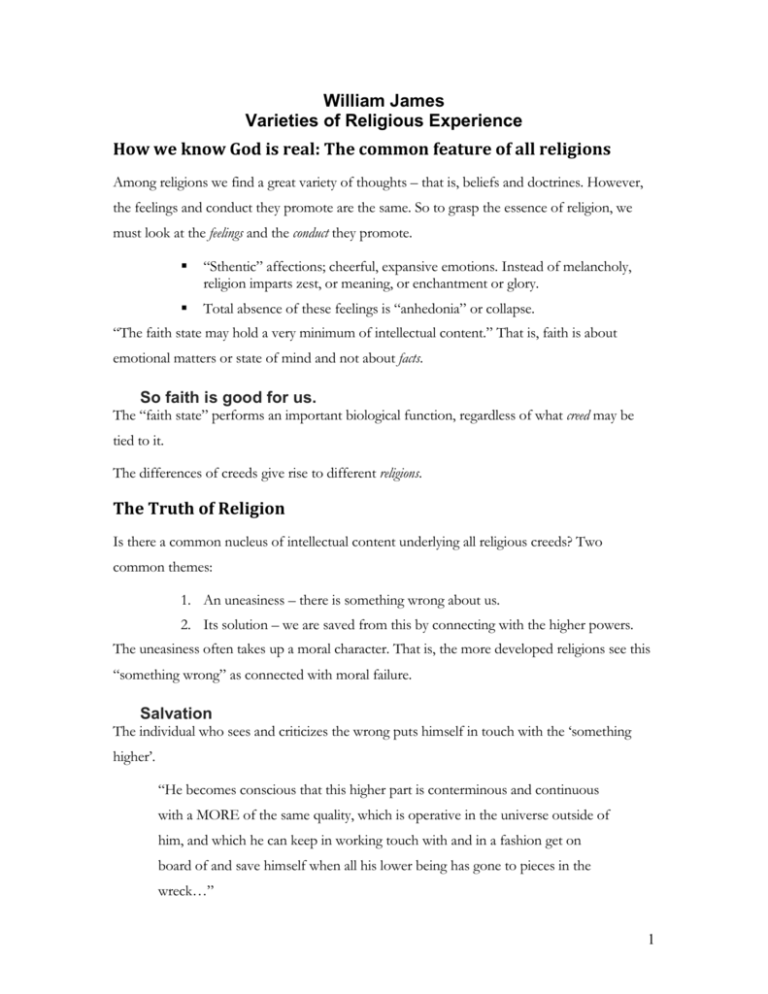
William James Varieties of Religious Experience How we know God is real: The common feature of all religions Among religions we find a great variety of thoughts – that is, beliefs and doctrines. However, the feelings and conduct they promote are the same. So to grasp the essence of religion, we must look at the feelings and the conduct they promote. “Sthentic” affections; cheerful, expansive emotions. Instead of melancholy, religion imparts zest, or meaning, or enchantment or glory. Total absence of these feelings is “anhedonia” or collapse. “The faith state may hold a very minimum of intellectual content.” That is, faith is about emotional matters or state of mind and not about facts. So faith is good for us. The “faith state” performs an important biological function, regardless of what creed may be tied to it. The differences of creeds give rise to different religions. The Truth of Religion Is there a common nucleus of intellectual content underlying all religious creeds? Two common themes: 1. An uneasiness – there is something wrong about us. 2. Its solution – we are saved from this by connecting with the higher powers. The uneasiness often takes up a moral character. That is, the more developed religions see this “something wrong” as connected with moral failure. Salvation The individual who sees and criticizes the wrong puts himself in touch with the ‘something higher’. “He becomes conscious that this higher part is conterminous and continuous with a MORE of the same quality, which is operative in the universe outside of him, and which he can keep in working touch with and in a fashion get on board of and save himself when all his lower being has gone to pieces in the wreck…” 1 “So far…as this analysis goes, the experiences are only psychological phenomena. They possess, it is true, enormous biological worth.” But: “What is the truth of their content?” Different religions assert different things: that God made a covenant with Abraham, that Jesus rose, that Mohammed is the Prophet. There are pantheistic religions and all sorts of mystical religions. What Religions Believe All religions do believe that this “MORE” exists. They also agree that it acts. If you throw yourself into its hands, your life is made better. So there is a common body of doctrine to all religions. What to call it If we call the “MORE” Jehovah and the means to it the righteousness of Christ, that “would be unfair to other religions.” James calls this “overbelief”. We need to find more general, less particularized terms. What can psychologists recognize as this “MORE”? The Subconscious The subconscious is acknowledged as real and seems to be a good mediating term. The subconscious seems to connect us with the larger background we consciously live in. James suggests: “whatever it may be on its farther side, the ‘more’ with which we feel ourselves connected is on its hither side the subconscious continuation of our conscious life. Starting thus with a recognized psychological fact as our basis, we seem to preserve a contact with “science” which the ordinary theologian lacks.” This creates the appearance of objectivity. God For Christians, God is the natural name we give this. “I only translate into schematic language what I may call the instinctive belief of mankind: God is real since he produces real effects.” The Effects of Belief The real effects of belief are exerted on the personal centers of energy in individual persons. “God’s existence is the guarantee of an ideal order that shall be permanently preserved.” So 2 tragedy is only “provisional and partial”, and dissolution is not absolutely final. But this hypothesis—that God exists—is not scientific and can’t be used to make predictions. “God, meaning only what enters into the religious man’s experience of union, falls short of being a hypothesis of this more useful order. He needs to enter into wider cosmic relations in order to justify the subject’s absolute confidence and peace.” That God should be absolute world-ruler is overbelief, even though most religions include this idea. So religion postulates new facts, upon which we act in a better way. They change our lives. A Final Word So, what about saints and martyrs? or even the suicide bomber? “Pragmatism explains everything about ideas except why a person would be willing to die for one.” (Louis Menand, The Metaphysical Club) 3



